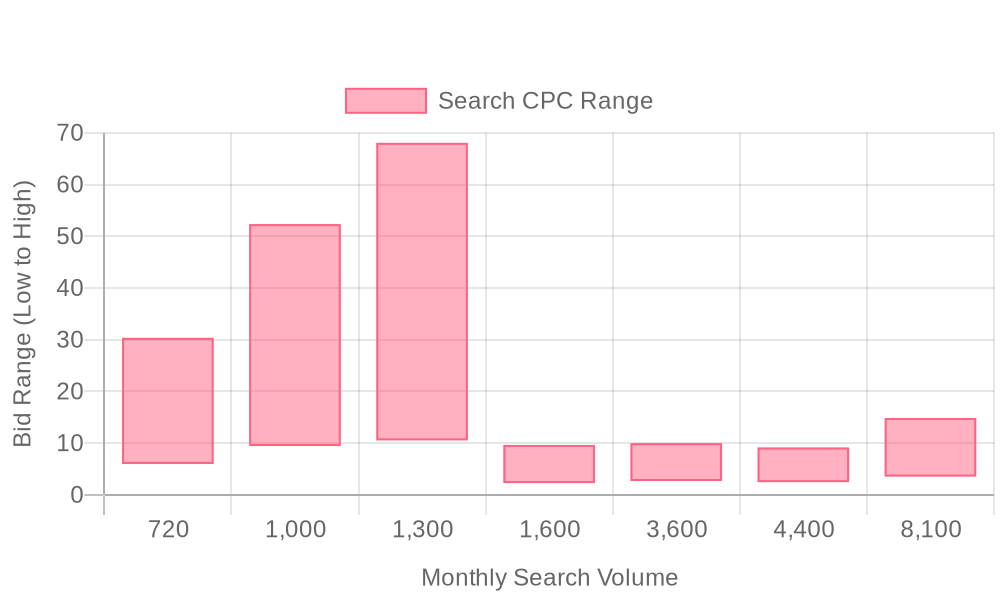
Supercharge your lead generation with a FREE Google Ads audit - no strings attached! See how you can generate more and higher quality leads
Get My Free Google Ads AuditFree consultation

No commitment
Supercharge your lead generation with a FREE LinkedIn Ads audit - no strings attached! See how you can generate more and higher quality leads
Get My Free Google Ads AuditFree consultation

No commitment
Supercharge your lead generation with a FREE Meta Ads audit - no strings attached! See how you can generate more and higher quality leads
Get My Free Google Ads AuditGet My Free LinkedIn Ads AuditGet My Free Meta Ads AuditFree consultation

No commitment
Supercharge your lead generation with a FREE Google Ads audit - no strings attached! See how you can generate more and higher quality leads
Get My Free Google Ads AuditFree consultation

No commitment
In today's competitive marketplace, industrial contractors face significant challenges in promoting their services and capturing potential clients at the right time. A common issue is missing high-value prospects who aren't tracked in CRMs, leading to lost opportunities. Advanced tools now allow businesses to identify these anonymous visitors and prioritize follow-up effectively, resulting in smarter budget allocations. Google Ads serves as a powerful tool to intercept high-intent prospects actively searching for contracting solutions, ensuring that your business remains top-of-mind. For industrial contractors, leveraging Google Ads not only boosts visibility but also complements other marketing channels by integrating online and offline data, allowing for precision targeting and complete ROI measurement from clicks to closed deals.

Industrial contractors seeking to accelerate sales pipeline growth can leverage Google Ads to connect with high-intent decision-makers actively searching for specialized services. A data-driven, automated approach eliminates manual bottlenecks and ensures every qualified lead remains engaged, even during complex, multi-stakeholder buying cycles. Learn how to maximize your ad spend for construction-related PPC, and discover actionable tips in our marketing insights blog to support ongoing pipeline growth.
By combining granular keyword targeting, dynamic audience segmentation, and cross-channel data integration, B2B revenue teams can streamline lead generation and attribution. The following framework offers a practical roadmap for industrial contractors to maximize Google Ads performance and convert more buyers at every stage of the funnel.

Industrial contractors operate in a landscape defined by specialized expertise, complex procurement cycles, and high-value projects. Digital advertising must deliver precision and speed, reaching decision-makers such as plant managers and procurement leaders when infrastructure investments are under review or urgent needs arise. Google Ads provides the infrastructure to connect with these audiences at pivotal decision points, driving qualified inquiries and building a robust project pipeline. For more insights on the unique challenges and strategies in this sector, explore these Google Ads best practices for construction.


Growth-minded industrial contractors excel when they move beyond generic campaigns and embrace a data-driven approach to demand generation. By identifying the nuanced needs and behaviors of industrial buyers, contractors can unlock untapped client segments and outpace competitors with sharper digital advertising for contractors. Leveraging intent signals allows marketers to pinpoint high-value prospects and tailor their outreach for maximum impact.
Integrating all these tactics with unified data infrastructure enables revenue teams to continuously refine targeting, enrich audience lists, and sync high-value leads between Google Ads, sales platforms, and CRM systems. This approach ensures ad budget for contractors is allocated to the most promising opportunities, boosts ROI measurement accuracy, and empowers revenue teams to act on timely, actionable insights. To experience smarter segmentation and targeting firsthand, get started for free with Sona.

Effective audience segmentation is fundamental for industrial contractors using Google Ads to maximize lead quality and ad spend efficiency. Segmenting your audience by industrial need, project type, or buying stage ensures every ad dollar targets accounts with the highest potential for engagement and conversion. This approach avoids the inefficiency of one-size-fits-all campaigns, which often result in wasted impressions and low-quality inquiries. For additional insight on optimizing Google Ads for construction, see this Google Ads PPC for construction overview.
If you want to see how segmentation and automation can drive better results for your industrial contracting ads, get started for free with Sona.

| Industry | Keyword | Monthly Search Volume | Competition Level | Low Bid | High Bid |
| Industrial Contractors | structural contractors near me | 720 | MEDIUM | 5.98 | 30.36 |
| Industrial Contractors | top hvac companies near me | 1000 | MEDIUM | 9.45 | 52.34 |
| Industrial Contractors | best hvac service near me | 1300 | MEDIUM | 10.55 | 68.05 |
| Industrial Contractors | industrial contractors | 1600 | LOW | 2.29 | 9.65 |
| Industrial Contractors | steel building contractors near me | 3600 | MEDIUM | 2.68 | 10 |
| Industrial Contractors | construction contract | 4400 | HIGH | 2.47 | 9.16 |
| Industrial Contractors | cement companies near me | 8100 | MEDIUM | 3.55 | 14.86 |
Precise keyword targeting is essential for industrial contractors aiming to reach procurement teams, facility managers, and decision-makers actively searching for specialized services. Prioritizing high-intent, industry-specific keywords allows campaigns to connect with prospects who are already evaluating vendors or preparing RFPs.
With unified data from website visits, CRM records, and ad engagement, marketers can identify which keywords drive the most valuable conversions—even beyond what is visible in Google Ads or standard CRM tracking. Real-time behavioral signals help prioritize spend on search terms linked to in-market accounts, allowing campaign managers to dynamically adjust bids and focus on the most promising opportunities. For additional insight on optimizing industrial campaign keywords and spend, explore this guide to PPC for industrial businesses. Enriched keyword data also supports dynamic audience creation, so as leads progress or new high-value prospects are identified, targeting adjusts instantly to match evolving intent across the buying journey. This approach ensures that every ad dollar is directed toward keywords proven to influence revenue outcomes for industrial contractors. Want to experience smarter keyword targeting? Get started for free with Sona.
Google Ads for industrial contractors requires a disciplined, data-driven approach that accounts for complex buying cycles and highly specific intent. Generic messaging and broad tactics produce subpar results in this sector where every click and conversion represents a significant business opportunity. The following framework ensures each campaign component is tailored to the unique demands of contractor marketing and industrial sales. For additional insights, explore our blog on B2B growth strategies.
Precise keyword targeting is fundamental for PPC advertising for contractors. Start by grouping high-intent keywords according to core service types—such as “industrial electrical installation” or “plant maintenance contractors”—and layering in local modifiers to reach buyers in relevant geographies. This segmentation improves ad relevance and reduces wasted spend. Implementing a dynamic approach where keyword lists update based on real-time visitor behavior allows revenue teams to immediately capture emerging demand and outperform static lists. By leveraging enriched audience data, marketers can identify which companies are searching for specific industrial services and prioritize keywords that consistently attract decision-makers.
Ad copy must speak directly to the priorities of industrial buyers. Address pain points like missed project deadlines, difficulty finding qualified partners, or navigating complex compliance requirements. Integrate elements that build trust, such as industry certifications, safety records, and proof of past project success. With access to in-market behavioral signals, teams can rapidly A/B test copy variations and shift budget toward messages that resonate with active, high-value accounts. These insights enable ads to reflect the current needs and urgency of the audience, increasing both click-through and conversion rates. For practical playbooks on messaging, review our marketing playbooks.
Landing pages for Google Ads campaigns targeting industrial contractors should align tightly with ad messaging and reinforce credibility. Incorporate detailed case studies, technical specifications, and testimonials from recognized industrial clients. Streamline the path to conversion with clear calls-to-action and minimal friction in form fill. By tracking both online and offline engagement—such as inbound calls and sales meetings—teams can attribute closed deals to specific campaigns, providing a full view of ROI. Real-time integration with CRM platforms ensures that leads generated from these pages are immediately routed to sales, accelerating the follow-up process and supporting sustained contractor lead generation.
Continuous optimization is critical for maximizing results in digital advertising for contractors. Smart bidding strategies adjust in real time based on conversion likelihood and account-level intent, ensuring budgets are concentrated on the prospects most likely to convert. Automated audience syncing across Google Ads and CRM platforms keeps targeting aligned with the latest funnel activity, so remarketing lists always reflect current pipeline opportunities. Advanced conversion tracking captures both online submissions and offline events, allowing revenue teams to measure the true impact of every dollar spent and refine their approach for higher efficiency. For tips on maximizing ROI, see this resource on Google Ads strategies for contractors.
Expanding your industrial contractor presence requires precision and a layered approach to digital advertising for contractors. Strategic execution ensures your brand not only reaches the right decision-makers but also achieves sustainable lead generation and measurable ROI. The most effective B2B revenue teams prioritize actionable targeting, segmented messaging, and continuous optimization to outperform industry benchmarks—see our latest B2B marketing insights for proven strategies.
Mastering Google Ads for industrial contractors starts with strategic keyword selection, sophisticated segmentation, and compelling creative tailored to technical buyers. Addressing sector-specific challenges such as lengthy sales cycles and complex stakeholder involvement is essential for contractor lead generation and conversion. With unified go-to-market data and advanced attribution, you gain a complete ROI picture, empowering your team to shift spend toward the audiences and messages driving the highest-value outcomes. To accelerate your results, get started for free with Sona and unlock precise targeting for your next campaign.
Leveraging Google Ads effectively can be a game-changer for industrial contractors looking to expand their reach and grow their business. By understanding the intricacies of keyword targeting, ad placement, and budget management, you can create campaigns that resonate with your target audience and drive meaningful engagement.
Throughout this article, we’ve explored the common challenges faced by industrial contractors venturing into the digital advertising space. From selecting the right keywords to optimizing ad spend and measuring success, each step plays a crucial role in crafting an impactful Google Ads strategy. By focusing on these core principles, you can overcome barriers and create ads that not only attract potential clients but also convert them into loyal customers.
Imagine the possibilities of transforming your business with the right digital tools. By integrating these strategies, you position yourself at the forefront of the industry, ready to capture new opportunities as they arise. This shift isn't just about increasing visibility; it's about building a robust marketing strategy that sustains long-term growth.
To further enhance your marketing efforts, consider exploring a platform that unifies your go-to-market data and delivers actionable insights. Start for free to experience our platform's capabilities and see firsthand how it can optimize your advertising strategy and drive results.
To create an effective Google Ads campaign, focus on precise keyword targeting, dynamic audience segmentation, and cross-channel data integration to streamline lead generation and attribution.
Allocate your budget based on data-driven insights, ensuring it is concentrated on prospects most likely to convert by using smart bidding strategies and continuous performance analysis.
Target high-intent, industry-specific keywords such as 'industrial contractors near me' and long-tail technical keywords like 'ASME-certified pipe welding contractor' to reach decision-makers actively searching for specialized services.
Measure success by linking advanced conversion tracking with CRM data to capture both online and offline actions, enabling precise ROI measurement from clicks to closed deals.
Avoid broad, one-size-fits-all campaigns and ensure your ad spend is not wasted on irrelevant or low-quality traffic by excluding terms like 'DIY' or 'jobs' through negative keywords.
Join results-focused teams combining Sona Platform automation with advanced Google Ads strategies to scale lead generation

Connect your existing CRM

Free Account Enrichment

No setup fees
No commitment required

Free consultation

Get a custom Google Ads roadmap for your business
Join results-focused teams combining Sona Platform automation with advanced Meta Ads strategies to scale lead generation

Connect your existing CRM

Free Account Enrichment

No setup fees
No commitment required

Free consultation

Get a custom Google Ads roadmap for your business
Join results-focused teams combining Sona Platform automation with advanced LinkedIn Ads strategies to scale lead generation

Connect your existing CRM

Free Account Enrichment

No setup fees
No commitment required

Free consultation

Get a custom Google Ads roadmap for your business
Join results-focused teams using Sona Platform automation to activate unified sales and marketing data, maximize ROI on marketing investments, and drive measurable growth

Connect your existing CRM

Free Account Enrichment

No setup fees
No commitment required

Free consultation

Get a custom Google Ads roadmap for your business
Over 500+ auto detailing businesses trust our platform to grow their revenue
Join results-focused teams using Sona Platform automation to activate unified sales and marketing data, maximize ROI on marketing investments, and drive measurable growth

Connect your existing CRM

Free Account Enrichment

No setup fees
No commitment required

Free consultation

Get a custom Google Ads roadmap for your business
Over 500+ auto detailing businesses trust our platform to grow their revenue
Join results-focused teams using Sona Platform automation to activate unified sales and marketing data, maximize ROI on marketing investments, and drive measurable growth

Connect your existing CRM

Free Account Enrichment

No setup fees
No commitment required

Free consultation

Get a custom Google Ads roadmap for your business
Over 500+ auto detailing businesses trust our platform to grow their revenue
Our team of experts can implement your Google Ads campaigns, then show you how Sona helps you manage exceptional campaign performance and sales.
Schedule your FREE 15-minute strategy sessionOur team of experts can implement your Meta Ads campaigns, then show you how Sona helps you manage exceptional campaign performance and sales.
Schedule your FREE 15-minute strategy sessionOur team of experts can implement your LinkedIn Ads campaigns, then show you how Sona helps you manage exceptional campaign performance and sales.
Schedule your FREE 15-minute strategy sessionOur team of experts can help improve your demand generation strategy, and can show you how advanced attribution and data activation can help you realize more opportunities and improve sales performance.
Schedule your FREE 30-minute strategy sessionOur team of experts can help improve your demand generation strategy, and can show you how advanced attribution and data activation can help you realize more opportunities and improve sales performance.
Schedule your FREE 30-minute strategy sessionOur team of experts can help improve your demand generation strategy, and can show you how advanced attribution and data activation can help you realize more opportunities and improve sales performance.
Schedule your FREE 30-minute strategy sessionOur team of experts can help improve your demand generation strategy, and can show you how advanced attribution and data activation can help you realize more opportunities and improve sales performance.
Schedule your FREE 30-minute strategy session





Launch campaigns that generate qualified leads in 30 days or less.
